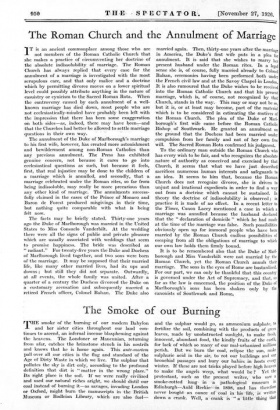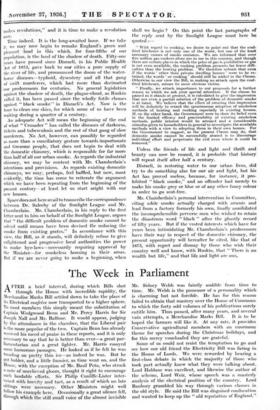The Smoke of our Burning
THE smoke of the burning of our modern Babylon and her sister cities throughout our land con- tinues to ascend, an infernal incense blaspheming against the heavens. The Londoner or Mancunian, returning from afar, catches the brimstone stench in his nostrils and knows that he is home again. This ante-mortem pall over all our cities is the flag and standard of the Age of Dirty Waste in which we live. The sulphur that pollutes the sky is dirt only, according to the profound definition that dirt - is " matter in the wrong place." Its right place is the soil. If we were really civilized and used our natural riches aright, we should distil our coal instead of burning it—as savages, invading London or Oxford; might burn the manuscripts in- the British Museum or Bodleian Library, which- are also fuel— and the sulphur would go, as ammonium sulphate, to fertilize the soil, combining with the products of green leaves, made by unobstructed sunlight, to make fresh, innocent, abundant food, the kindly fruits of the earth, for lack of which so many of our mal-urbanized millions perish. But we burn the coal, eclipse the sun, make sulphuric acid in the air, to rot our buildings and our bronchial passages and bury our babies in hosts every' winter. If these are not tricks played before high heaven to make the angels weep, what would be ? Yet the protestant, such- as the present writer, who saw 9 ro smoke-tted I lung - in a pathological museum n Edinburgh—Auld Reekie=--in 1898, and has therefore never bought an ounce of coal in •his life, is written down a crank. Well, a crank is - " a -little thing that 'makes revolutions," and it is time to make a revolution , .
ROW.
Time indeed. It is the long-awaited hour. If we take it, we may now begin to remake England's green and pleasant land in this which, for four-fifths of our population, is the land of the shadow of death. Fifty-one 'years have passed since Disraeli, in his Public Health Act of 1875, gave back to our cities a pure-supply of the river of life, and pronounced the doom of the water- borne diseases—typhoid, dysentery and all that gang of swift murderers, which had more than decimated our predecessors for centuries. No general legislation against the shadow of death, the plague-cloud, as Ruskin called it, has been passed since the wholly futile clauses against " black smoke" in Disraeli's Act. Now is the hour to clean our skies, for which some of us have been waiting during a quarter of a century; An adequate Act will mean the beginning of the end of what " Crusader " has called the diseases of darkness, rickets and tuberculosis and the rest of that gang of slow murderers. No Act, however, can possibly be regarded as more than a conciliatory gesture towards importunate and tiresome people, that does not begin to deal with the domestic chimney, which is responsible for far more than half of all our urban smoke. As regards the industrial chimney, we may be content with Mr. Chamberlain's intentions and provisions. As regards existing domestic chimneys, we may, perhaps, feel baffled, but now, most evidently, the time has come to reiterate the argument which we have been repeating from the beginning of the present century—at least let us start aright with our new houses.
Space does not here avail to transcribe the correspondence between Dr. Saleeby of the Sunlight League and Mr. Chamberlain. Mr. ChaMberlain, in hiS reply to the first letter sent to him on behalf of the Sunlight League, argues that " the difficult problem of domestic smoke cannot be solved until means have been devised for reducing the smoke from existing grates." In accordance with this view, the Bill, as it stands, will definitely refuse to give enlightened and progressive local authorities the power to make bye-laws—necessarily requiring approval by the Minister—for , smokeless housing in their areas. But if we are never going to make a beginning, when shall we begin ? On this point the last paragraphs of the reply sent by the Sunlight League must here be quoted :— " With regard to cooking, we desire to point out that the coal- fired kitchener is not only one of the worst, but one of the least necessary causes of smoke emissien. We are informed that over five million gas cookers alone are in use in this country, and though there are certain places in which the price of gas is prohibitive or gas is not even available, the cooking problem presents far fewer diffi- culties than the heating problem. We therefore submit that even if the words other than private dwelling houses' were to be re• tamed, the words' or cooling' should still be added in the Clause. .Otherwise in our view the Bill, in making no attack upon the coal- fired kitchener, misses its most obvious victim.
" Finally, we attach importance to our proposals for a further reason to which we ask your special attention. If the clause be passed as it stands at present, it is calculated to give the impression that not oven a partial solution of the problem of domestic smoke is at hand. We believe that the effect of creating this impression will be definitely to retard the spontaneous adoption of smokeless methods of heating and cooking especially in existing houses. If, on the other hand, the Government were to show its belief even in the limited efficacy and practicability of existing smokeless methods, public interest would be amused and a considerable stimulus given to householders in general to investigate the available methods with a view to adopting them in their own homes. For the Government to suggest, as the present Clause may do, that domestic smoke cannot be successfully abated is to discourage individual effort and perpetuate the evil even where it could be removed."
Unless the friends of life and light and thrift and beauty can now be roused, it is probable that history will repeat itself after half a century.
Disraeli, in restoring water to our urban lives, did try to do something also for our air and light, but his Act has proved useless, because, for instance, it pro- hibited " black smoke," and an offender had merely to make his smoke grey or blue or of any other fancy colour in order to go scot-free.
Mr. Chamberlain's personal intervention in Committee, citing white smoke actually charged with arsenic and lead from a factory formerly his own, finally annihilated the incomprehensible perverse men who wished to retain the disastrous word " black " after the ghastly record *of fifty years. But if the vested interests which have for years been intimidating Mr. Chamberlain's predecessors have their way in respect of the domestic chimney, the present opportunity will hereafter be cited, like that of 1875, with regret and dismay by those who wish their country well and know, with Ruskin, that " There is no wealth but life," and that life and light are one.



















































 Previous page
Previous page